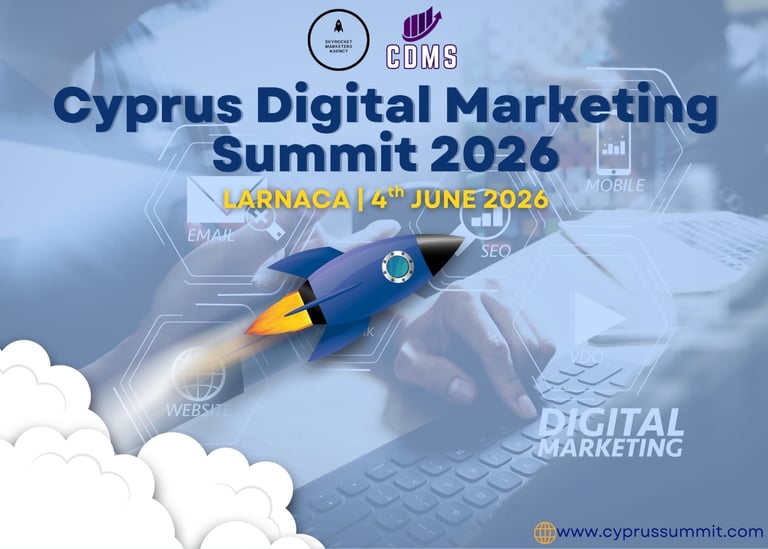Storytelling in Marketing: Connecting With Cypriot Audiences
SEO
9/10/20254 min read


Cyprus has always been a land of stories. From the myths of Aphrodite rising from the waves at Petra tou Romiou to the oral traditions passed down in village squares, storytelling has been central to the island’s cultural fabric. In the modern marketplace, where digital advertising often reduces brands to metrics and algorithms, the enduring power of storytelling remains as relevant as ever. For Cypriot businesses navigating a competitive and diverse landscape, storytelling in marketing is not just a creative flourish—it is a vital tool for connection, trust, and long-term loyalty.
At its essence, storytelling is about humanizing a message. Consumers in Cyprus, like anywhere else, are weary of cold, transactional advertising that pushes products without context or emotion. What captures attention is not simply what a business sells but the story behind it. A family-run winery in Limassol that shares tales of vineyards passed down through generations does more than promote wine; it invites audiences to taste heritage and continuity. Similarly, a boutique hotel in Paphos that weaves narratives of local history and personal guest experiences transforms a simple stay into a memorable journey. By grounding marketing in authentic stories, businesses shift the focus from product features to emotional resonance.
Cypriot audiences, in particular, respond to authenticity and community. The island’s small size fosters intimacy, where word-of-mouth remains powerful and reputations are built on trust. Storytelling aligns naturally with these values. A fitness studio in Nicosia that highlights the personal stories of its members—how they achieved balance in their lives or overcame challenges—becomes more than a service provider; it becomes part of the client’s narrative. This sense of shared identity encourages loyalty because customers see themselves reflected in the brand’s story.
The bilingual nature of Cyprus further amplifies the importance of storytelling. With Greek and English coexisting as dominant languages, businesses have the opportunity to tell their stories across cultural lines. An artisan in Larnaca might use Greek to connect with locals who value tradition, while using English to reach expatriates and tourists who are curious about the island’s craftsmanship. The stories remain the same, but the language adapts, allowing brands to cross boundaries and resonate with multiple audiences simultaneously. This dual-language storytelling not only broadens reach but also reinforces inclusivity, demonstrating cultural awareness and respect.
Tourism, one of the pillars of the Cypriot economy, offers a clear illustration of the effectiveness of storytelling. Visitors are not drawn solely by beaches and hotels but by the promise of experiences. A tour company that presents itself as a guide to hidden villages, each with its own tale of customs and festivals, creates a far stronger appeal than one that merely lists itineraries. Stories make the intangible tangible, transforming a trip into an emotional memory. For local audiences, the same principle applies. A bakery that tells the story of its recipes handed down from a grandmother evokes nostalgia and pride, turning a loaf of bread into a symbol of continuity and belonging.
Digital platforms have only expanded the potential of storytelling. Social media, blogs, and video content allow Cypriot businesses to narrate their journeys in real time, inviting audiences into their processes and milestones. A tech startup in Nicosia can share the struggles and triumphs of innovation, building transparency and relatability. A restaurant in Ayia Napa can showcase not only its dishes but also the story of its farmers and suppliers, connecting the consumer to the wider ecosystem of local production. In this way, storytelling transcends marketing and becomes a form of community-building, binding audiences and businesses together through shared experiences.
Yet effective storytelling requires sincerity. Cypriot audiences, shaped by close-knit social networks, can quickly sense when a narrative is fabricated or exaggerated. Authenticity must therefore guide every effort. Businesses should draw on real experiences, customer voices, and genuine heritage rather than manufactured slogans. The strength of storytelling lies in its truth, however modest. Even small details—such as a café owner describing the morning ritual of opening the doors and smelling the first brew of coffee—can create powerful connections if they are real.
The strategic power of storytelling also lies in differentiation. In a globalized market where many businesses offer similar products or services, stories distinguish one brand from another. Two law firms in Limassol may offer identical services, but the one that tells the story of its commitment to helping local families secure their futures will resonate more strongly. Similarly, two hotels in Protaras may compete on amenities, but the one that tells stories of personal touches—like a staff member going out of their way to make a guest feel at home—will remain in the client’s memory long after the holiday ends.
Ultimately, storytelling in marketing is about forging human connections in a world of endless choices. For Cypriot businesses, it is an opportunity to align with the island’s own narrative traditions, where identity, heritage, and community have always mattered. In weaving their stories into the fabric of everyday life, businesses transform themselves from mere service providers into meaningful presences in people’s lives. They not only attract clients but also invite them into an ongoing narrative, one in which the audience plays a role as participant rather than passive observer.
In a marketplace saturated with digital noise, stories cut through because they are remembered, shared, and cherished. For Cyprus, a land where myth and memory shape both culture and commerce, storytelling is more than a marketing strategy—it is the secret to connection. Businesses that embrace it not only speak to their audiences but also become part of their lives, proving that in the end, the most powerful way to sell is simply to tell.
Contact
info@skyrocketmarketers.com
+357 96166570
2026 Skyrocket Marketers © All Rights Reserved.
Limassol Office
Victory House, Arch. Makarios III Avenue 205, Limassol, 3030
Nicosia Office
Digenis Ave 81-83 Grivas 1st, 5th Floors, Nicosia, 1090
Useful Links
Top Digital Marketing Agencies For Financial Services
Everneed AI Receives AI Software Recognition
GURU OF THE DAY: Web Design Award
King Of The Day: Web Design Award
Cyprus Digital Marketing Summit 2026
Cyprus Videographer/Photographer


NEWSLETTER
EVERNEED AI LTD


